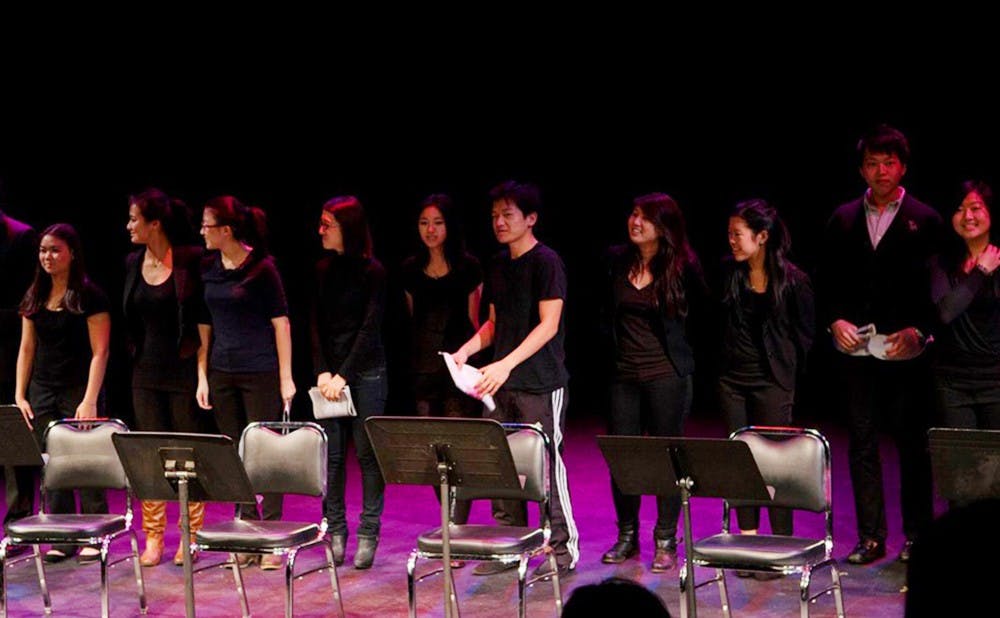Starting on Saturday night, several students will write, direct and perform in a series of plays within the span of just 24 hours.
This Sunday at 8 p.m. in Sheafer Lab Theater, Duke Asian American Theater (DAAT) will perform the final products of their inaugural 24-Hour Play Festival. The student-run theater company is one that aims to promote awareness of the theater genre and increase opportunities and collaborations between Asian American students.
“I wanted Duke Asian American students to have the experience of expressing themselves through theater and making sure their voices are heard and their talents recognized,” Claire Conceison, professor of theater studies and Asian and Middle Eastern studies and faculty advisor for DAAT, said in an email.
The organization is new and was only officially recognized about a year ago. Conceison herself founded an Asian American theater group while she was an undergraduate at Wesleyan University. Two years ago, Conceison expressed in class that she hoped to see students at Duke do the same, and one of her students, Rachel Whitney, a senior studying mechanical engineering and minoring in theater studies, stepped forward to spearhead the initiative.
“I think that a lot of Asian Americans are interested in theater, but there just wasn’t really an outlet for them,” Whitney said. “I wanted to start this theater group to strengthen Asian Americans on campus through performance.”
Since then, DAAT has secured its place in the arts at Duke. It has thus far hosted discussions (actor James Saito visited last fall), co-sponsored an evening of scenes and held two public staged readings to get as many involved in the productions as possible.
Institutionally, Duke lacks an Asian American studies program or department, even though a fifth of the undergraduate population identifies as Asian American. The lack of an academic resource (as well as a social resource, such as a space specified for Asian American students to gather) requires that students create their own organizations and opportunities. Groups like DAAT, along with the Asian Student Association or a major event like Lunar New Year, have helped to fill that gap.
Still, Duke reflects the wider pattern of lacking representation for Asian Americans in the arts. In terms of public expression at the university, Asian Americans are particularly underrepresented. Works by Asian and Asian American playwrights are rarely produced, and so their stories and narratives are often left untold or unexplored.
“Student and faculty directors at Duke do have open minds and want diverse casts,” Conceison said. “I think it’s important we make that as clear as possible to students by how we cast plays and what scripts and projects we choose to produce, and also by what we teach in our classes—making sure those courses include the narratives of Asians and Asian Americans.”
Asian American theater, as a genre, is broad and continually evolving. It is comprised of works by Asian American playwrights as well as the performance of non-Asian American plays by Asian American actors, who, as Conceison noted, are often not cast in “canonical” Western plays. Additionally, the genre increasingly incorporates pan-Asian and diasporic collaborations between American and Asian artists, extending to experimental art, dance and multimedia.
“A lot of plays don’t necessarily have parts available for Asian Americans, or Asian Americans aren’t normally cast as leads in musicals and plays in general,” said Whitney. Whitney’s mother, who is Japanese American, was often typecast as an actress; in many of her roles, the character description simply read “Asian American.”
DAAT addresses and brings awareness of these larger conversations to the Duke campus by celebrating Asian American playwrights and encouraging Asian American student involvement. The group aims for inclusiveness and integration, forming a gateway for students of any background who have never participated in theater. Notably, it lays a foundation by which Asian American voices can be heard.
“Many Asian American playwrights write about Asian American history. For example, most people know about the Japanese internment camps during WWII, but through a play, you really get a better sense of what life was like then,” Whitney explained. Her own grandparents met in one of these internment camps. “You’re learning Asian American history and at the same time can identify with the voices that are represented in the plays. You find yourself identifying with characters and learning about the history of Asian Americans living in the U.S. that you didn’t know as much about as you thought you did.”
DAAT’s next event, the 24-hour play festival, will be the first of its kind at Duke. The festival involves a production of several short plays that are written, directed and performed within the span of 24-hours, after which a performance is staged. Those participating and those watching will have no idea of the content.
“[The 24-hour play festival] thrives on creativity and collaboration,” Conceison said. “The participants will have a theater experience that is totally new and different, and the audience will see new talent and a new theater format.”
The 24-hour play festival is ideal in that it requires little advanced preparation but still engages several students, experienced or not, as playwrights, directors and actors. It fosters a space for diverse student voices to be heard and expressed in a live setting, and DAAT hopes to make the 24-hour play festival an annual tradition.
“I hope that more people are aware of DAAT,” Whitney said. “It’s a learning experience…and it’ll definitely be very entertaining. They ultimate goal is that everyone enjoys themselves and are excited to get more involved in theater.”
The Duke Asian American Theater 24-Hour Play Festival will be Sun., February 23, at 8 p.m. in Sheafer Lab Theater. General seating is $5 and student admission is free. Tickets are available in advance at the box office.
Get The Chronicle straight to your inbox
Signup for our weekly newsletter. Cancel at any time.

